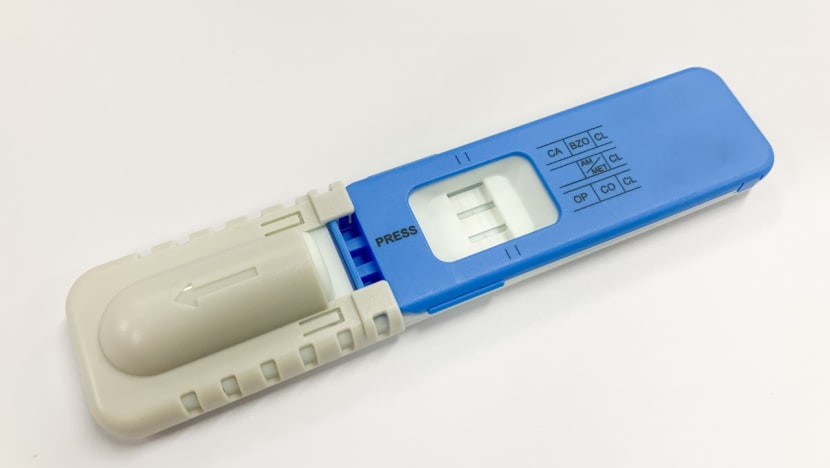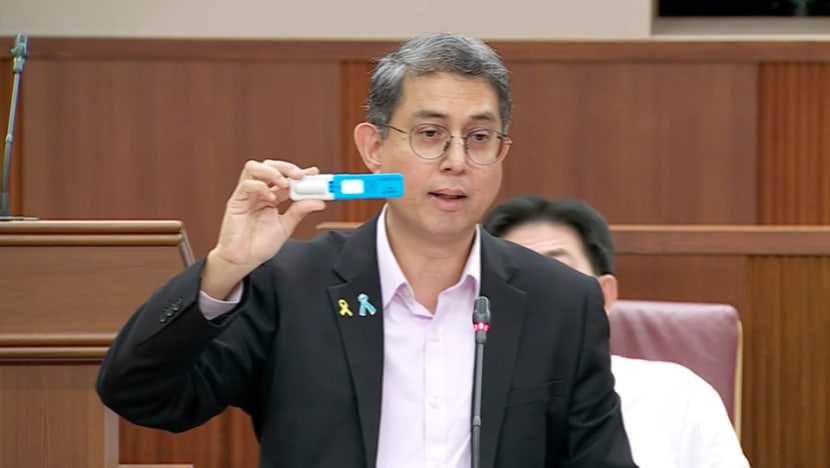Saliva testing rolled out at Singapore roadblocks, checkpoints to nab drug users
The process takes an average of 10 minutes and those who test positive will be subjected to further investigations.

A saliva test kit. (Photo: Central Narcotics Bureau)
SINGAPORE: Saliva tests are now being used at Singapore's border checkpoints and roadblock operations to detect drug users, said Minister of State for Home Affairs Muhammad Faishal Ibrahim in Parliament on Monday (Feb 27).
This comes as drug use around the world continues to rise, with Thailand becoming the first Asian country to decriminalise cannabis last year, Associate Professor Faishal added.
He was speaking on the topics of terrorism, drugs and rehabilitation during the Committee of Supply debates.
To deter Singaporeans and permanent residents from consuming drugs abroad, the Central Narcotics Bureau (CNB) began using saliva test kits at checkpoints in January this year, he said.
The kits – which detect a variety of drugs such as cocaine, methamphetamine and cannabis – have also been used during inland enforcement operations.
“These kits, like the one I am holding here – they are light and compact. They offer a more efficient way to detect drug abusers at the checkpoints,” added Assoc Prof Faishal in response to a question by MP Gan Thiam Poh (PAP-Ang Mo Kio) on how the Ministry of Home Affairs (MHA) is stepping up drug enforcement.

It is against the law for Singaporeans and PRs to take drugs overseas. Other methods, such as a hair test or urine test, can also be used to test for drug consumption.
Assoc Prof Faishal told the House that CNB and the police also began trialling joint roadblock operations this month to detect drug abusers. Saliva test kits will be used at these operations.
Saliva testing takes an average of 10 minutes and those who test positive will undergo further investigations.
In response to another question by Mr Gan for more information on the saliva test kits, Assoc Prof Faishal said they can also detect drug metabolites, which form when the body breaks down or metabolises a drug into a different substance.
Officers will swab a suspected drug user’s tongue and get results “in about eight to 10 minutes”, he noted, adding that the saliva test kits are similar to COVID-19 test kits as red lines will appear if particular drugs are present.
“Nevertheless, we will also have a double check. If we find someone has test results which are positive, we will bring them back to do further testing.”
A CNB spokesperson told CNA that before saliva test kits were rolled out, officers would have to escort all suspected drug users to the CNB office for a urine test.
"This process takes significantly longer and requires more resources as it involves transporting the suspects to another location, and the procurement of urine specimens. Some of the suspects might eventually test negative," the spokesperson said.
CONCERNS OVER YOUTH DRUG USE
Assoc Prof Faishal reiterated that while the drug situation in Singapore “remains under control”, the authorities are concerned about drug use among youths, with about half of new abusers arrested last year aged below 30.
“While most youths support a tough stance against drugs, some younger Singaporeans take a more permissive attitude, especially towards cannabis,” he added.
CNB revealed earlier this month that the number of cannabis abusers aged below 20 who were arrested increased threefold from eight in 2021 to 26 in 2022.
They formed about a fifth of all youth drug abusers arrested in 2022.
Saliva tests are now being used at Singapore's border checkpoints and roadblock operations to detect drug users, said Minister of State for Home Affairs Muhammad Faishal Ibrahim in Parliament on Monday (Feb 27). Aslam Shah reports.
Methamphetamine remained the most abused drug in Singapore last year, with the 1,445 abusers arrested making up 51 per cent of the total number.
CNB will work with the Ministry of Education to ensure all primary and secondary schools conduct at least one preventive drug education programme annually.
Secondary schools that did not hold a preventive drug education engagement in the last two years will also conduct at least one such engagement this year.
In terms of new psychoactive substances, which produce the same or similar effects as controlled drugs, Assoc Prof Faishal noted that MHA proposed amendments to the Misuse of Drugs Act last week to combat the growing use of psychoactive substances.
Under the new proposed framework, substances will not be controlled based on their chemical structure, but instead on their capacity to produce a psychoactive effect.
“This will empower CNB to take swift enforcement actions against illicit activities involving such psychoactive substances,” said Assoc Prof Faishal.
Offenders who possess a large amount of certain controlled drugs, such as cocaine or cannabis, may also face more severe punishments if the legislative amendments are passed in Parliament.















